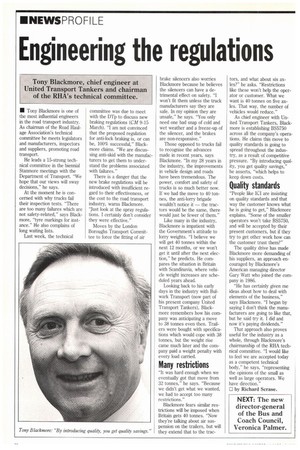Engineering the regulations
Page 12

If you've noticed an error in this article please click here to report it so we can fix it.
Tony Blackmore, chief engineer at United Transport Tankers and chairman of the RHA's technical committee.
• Tony Blackmore is one of the most influential engineers in the road transport industry. As chairman of the Road Haulage Association's technical committee he meets legislators and manufacturers, inspectors and suppliers, promoting road transport.
He leads a 15-strong technical committee in the biennial Stanmore meetings with the Department of Transport. "We hope that our views will sway decisions," he says.
At the moment he is concerned with why trucks fail their inspection tests. "There are too many failures which are not safety-related," says Blackmore, "tyre markings for instance." He also complains of long waiting lists.
Last week, the technical
committee was due to meet with the DTp to discuss new braking regulations (CM 9-15 March). "1 am not convinced that the proposed regulation for anti-lock braking is, or can be, 100% successful," Blackmore claims. "We are discussing anti-skid with the manufacturers to get them to understand the problems associated with failures."
There is a danger that the new brake regulations will be introduced with insufficient regard to their effectiveness, or the cost to the road transport industry, warns Blackmore. "Just look at the spray regulations. I certainly don't consider they were effective."
Moves by the London Boroughs Transport Committee to force the fitting of air brake silencers also worries Blackmore because he believes the silencers can have a detrimental effect on safety. "I won't fit them unless the truck manufacturers say they are safe. In my opinion they are unsafe," he says. "You only need one bad snap of cold and wet weather and a freeze-up of the silencer, and the brakes are non-responsive."
Those opposed to trucks fail to recognise the advances made in recent years, says Blackmore. "In my 28 years in the industry, the improvements in vehicle design and roads have been tremendous. The power, comfort and safety of trucks is so much better now. If we had the move to 40 tonnes, the anti-lorry brigade wouldn't notice it — the tractors would be the same, there would just be fewer of them."
Like many in the industry, Blackmore is impatient with the Government's attitude to lorry weights. "I believe we will get 40 tonnes within the next 12 months, or we won't get it until after the next election," he predicts. He compares the situation in Britain with Scandinavia, where vehicle weight increases are scheduled years ahead.
Looking back to his early days in the industry with Bulwark Transport (now part of his present company United Transport Tankers), Blackmore remembers how his company was anticipating a move to 38 tonnes even then, Trailers were bought with specifications which would cope with 38 tonnes, but the weight rise came much later and the company paid a weight penalty with every load carried.
Many restrictions
"It was hard enough when we eventually got that move from 32 tonnes," he says. "Because we didn't get what we wanted, we had to accept too many restrictions."
Blackmore fears similar restrictions will be imposed when Britain gets 40 tonnes. "Now they're talking about air suspension on the trailers, but will they extend that to the trac
tors, and what about six axles?" he asks. "Restrictions like these won't help the operator or customer. What we want is 40 tonnes on five axles. That way, the number of vehicles would reduce."
As chief engineer with United Transport Tankers, Blackmore is establishing BS5750 across all the company's operations. He claims this move to quality standards is going to spread throughout the industry, as a result of competitive pressure. "By introducing quality, you get quality savings," he asserts, "which helps to keep down costs.
Quality standards
"People like ICI are insisting on quality standards and that way the customer knows what he is going to get," Blackmore explains. "Some of the smaller operators won't take BS5750, and will be accepted by their present customers, but if they try to get other work how can the customer trust them?"
The quality drive has made Blackmore more demanding of his suppliers, an approach encouraged by Blaclunore's American managing director Gary Watt who joined the company in 1986.
"He has certainly given me ideas about how to deal with elements of the business," says Blackmore. "I began by saying I don't think the manufacturers are going to like that, but he said try it. I did and now it's paying dividends."
That approach also proves useful for the industry as a whole, through Blackmore's chairmanship of the RHA technical committee. "I would like to feel we are accepted today as a competent technical body," he says, "representing the opinions of the small as well as large operators. We have direction."
I=1 by Richard Scrase.








































































































































